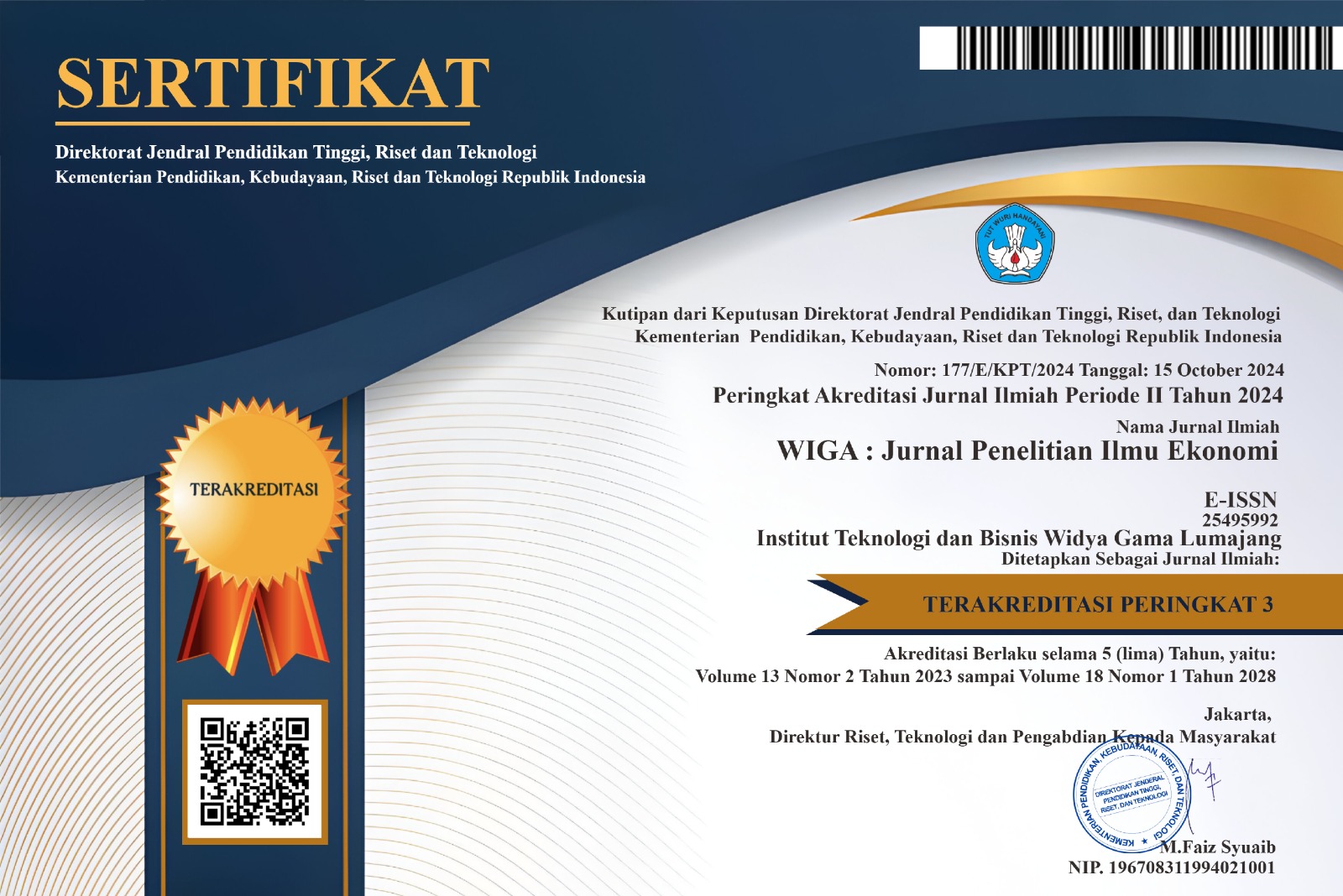The Effect of Socio-Economic Conditions on the Happiness Index: ASEAN-8 Study 2015-2021
DOI:
https://doi.org/10.30741/wiga.v15i1.1262Keywords:
Happiness Index, social variables, economic variables, environment, goverment qualityAbstract
People’s well-being is a core goal of national development and can be assessed through the happiness index, which reflects overall quality of life. In the face of increasingly complex development challenges across ASEAN, identifying the determinants of happiness is crucial for shaping effective, targeted policies. This study analyzes the impact of various socio-economic and environmental factors—namely Gross Domestic Product (GDP) per capita, labor force, government budgets for education and health, Consumer Price Index (CPI), Corruption Perception Index (CPI), and greenhouse gas emissions per capita—on the happiness index of eight ASEAN countries during 2015–2021. Using panel data analysis, the Fixed Effect Model (FEM) was identified as the best-fit model. The findings reveal that GDP per capita and Corruption Perception Index have a significant negative effect on the happiness index, while education spending and CPI exert a positive influence. Meanwhile, labor force, health budget, and greenhouse gas emissions show no significant impact. Among the observed countries, Singapore ranks highest in happiness, while Cambodia ranks lowest. These results suggest that beyond traditional economic indicators, governance quality—reflected in effective budget allocation and efforts to manage inflation and corruption—plays a vital role in fostering happiness in the ASEAN region.
Downloads
References
Abdullah, Y. A., & Zulkifli, F. L. (2016). Concepts and Theories of Happiness of Population in Urban Neighbourhoods. Environment-Behaviour Proceedings Journal, 1(1), 260–268. Doi: 10.21834/e-bpj.v1i1.222
Aditia, N. M. A., & Dewi, N. P. M. (2018). Pengaruh Pengeluaran Pemerintah Di Bidang Pendidikan, Kesehatan Dan Ekonomi Terhadap Tingkat Kesejahteraan Masyarakat Di Provinsi Bali. E-Jurnal Ekonomi Pembangunan Universitas Udayana, 7(2), 212–242. https://ojs.unud.ac.id/index.php/eep/article/view/33608
Badan Pusat Statistik Indonesia. (2021). Indeks Kebahagiaan 2021. Badan Pusat Statistik RI. https://www.bps.go.id/id/publication/2021/12/27/ba1b0f03770569b5ac3ef58e/indeks-kebahagiaan-2021.html
Chen, G., Qiu, F., Dai, X., Lan, H., & Song, J. (2022). Research on the Influence of Informal Employment on Residents’ Happiness in China: Empirical Analysis Based on CLDS Data. International Journal of Environmental Research and Public Health, 19(15). Doi: 10.3390/ijerph19159085
Chen, N., Chen, H. C., & Lin, S. Y. (2020). Effect of education–occupation mismatch on happiness. International Journal of Social Economics, 47(1), 86–110. Doi: 10.1108/IJSE-04-2019-0283
Easterlin, R. A., & O’Connor, K. J. (2020). Discussion Paper Series: The Easterlin Paradox. Institute of Labor Economics, IZA DP No.13923, 1–40. https://docs.iza.org/dp13923.pdf
Helliwel, J. F., Layard, R., Sachs, J., & Neve, J. E. De. (2020). WellBeing International WellBeing International WBI Studies Repository WBI Studies Recommended Citation Recommended Citation. 1–203. https://www.wellbeingintlstudiesrepository.org/hw_happiness
Helliwell, J. F., Wang, S., Huang, H., & Norton, M. (2022). Happiness, benevolence, and trust during COVID-19 and beyond. World Happiness Report 2022, 15–52. https://happiness-report.s3.amazonaws.com/2022/WHR+22_Ch2.pdf
Helliwell, J., Layard, R., & Sachs, J. (2012). World Happiness Report. Journal of Universal College of Medical Sciences, 11(01), 1. https://doi.org/10.3126/jucms.v11i01.54662
Ilham, L., & Farid, A. (2019). Kebahagiaan dalam Perspektif Masyarakat Marginal (Studi Masyarakat Desa Hadipolo Argopuro Kudus Jawa Tengah). Jurnal Sosiologi Agama, 13(2), 95. Doi: 10.14421/jsa.2019.132-05
Kapteyn, A., Smith, J. P., & Soet, A. van. (2009). Life satisfaction Arie Kapteyn. IZA Discussion Papers, No.4015. https://nbn-resolving.de/urn:nbn:de:101:1-20090304722
Kumalasari, D. A., & Yasa, I. G. W. M. (2020). Pengaruh Faktor-Faktor Yang Mempengaruhi Tingkat Kebahagiaan Negara Di Dunia. E-Jurnal Ekonomi Pembanunan Unud, 9, 963–992. https://ojs.unud.ac.id/index.php/eep/article/view/56719
Layard, R., & Cooper, R. N. (2005). Happiness: Lessons from a New Science. Foreign Affairs, 84(6), 139. Doi: 10.2307/20031793
Ribeiro, L. L., & Marinho, E. L. L. (2017). Gross National Happiness in Brazil: An analysis of its determinants. EconomiA, 18(2), 156–167. Doi; 10.1016/j.econ.2016.07.002
Roka, D. (2020). The Effect of Human Development on Happiness: A Comparative Study of UN Member States. International Journal of Science and Business, 4(4), 61-78. Doi: 10.5281/zenodo.3736375
Sapriyadi, Kartomo, & Muhammad Syaiful. (2022). Pembangunan Dan Kebahagiaan: Studi Empiris Di Negara Asea. Journal of Economic, Public, and Accounting (JEPA), 4(2), 144–153. Doi: 10.31605/jepa.v4i2.1278
Shipley, T. (2021). Searching for True Happiness. Proceedings of the Jepson Undergraduate Conference on International Economics, 3. https://scholarworks.uni.edu/jucie/vol3/iss1/1
Suparta, I. W., & Malia, R. (2020). Analisis Komparasi Hapiness Index 5 Negara di Asean. Jurnal Ekonomi Pembangunan, 9(2), 56–65. Doi: 10.23960/jep.v9i2.79
Wanti, T. S., & Fafurida. (2023). Pengaruh Sustainable Development Goals Terhadap Indeks Kebahagiaan di Negara Asia Pengaruh Sustainable Development Goals Terhadap Indeks Kebahagiaan di Negara Asia. Education Economics & Education Journal, 5(2), 186–209. http://ejurnal.budiutomomalang.ac.id/index.php/ecoducation
Yasir, J. R., Muang, M. S. K., & Sani, M. (2022). Analisis Dimensi Kepuasan Hidup terhadap Indeks Kebahagiaan Masyarakat di Kecamatan Bara Kota Palopo. JEMMA (Journal of Economics, Management and Accounting), 5(2), 182. Doi: 10.35914/jemma.v5i2.1332
Downloads
Published
How to Cite
Issue
Section
License
Copyright (c) 2025 Amelia Metasari, Yuni Prihadi Utomo

This work is licensed under a Creative Commons Attribution-NonCommercial 4.0 International License.










